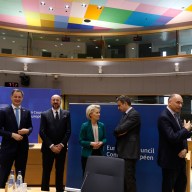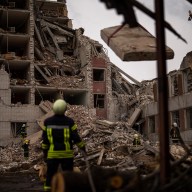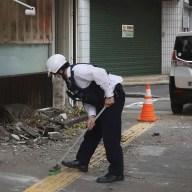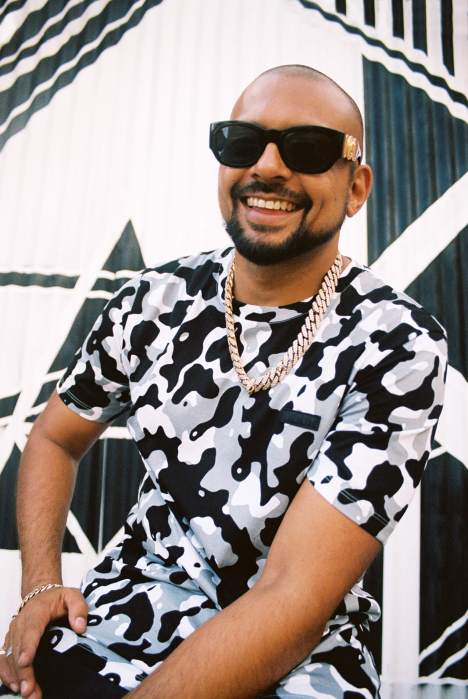By Hyonhee Shin and Ju-min Park
SEOUL (Reuters) – South Korea plans to send a special envoy to North Korea in response to an invitation from leader Kim Jong Un, South Korean President Moon Jae-in told his U.S. counterpart Donald Trump in a phone call on Thursday.
The two presidents discussed recent visits to the South by high-level North Korean officials, the presidential Blue House in Seoul said in a statement.
The Winter Olympics in Pyeongchang last month gave a boost to recent engagement between the two Koreas after more than a year of sharply rising tensions over the North’s missile programme and its sixth and largest nuclear test in defiance of United Nations sanctions.
“(Moon and Trump) agreed to continue to make efforts to head towards the Korean peninsula’s denuclearisation by maintaining the momentum of South-North dialogue,” the Blue House statement said.
In Washington, a White House statement on the two leaders’ call said Moon briefed Trump “on developments regarding North Korea and inter-Korean talks” but did not elaborate.
“The president wants to continue working with South Korea. It’s a strong ally. We have no daylight between the two of us. We’re going to continue those conversations,” White House spokeswoman Sarah Sanders told reporters later on Thursday.
“The ultimate goal is to denuclearise the peninsula. That’s what we’re focused on and we’re excited about any steps moving forward in that process,” she said.
In sending an envoy to Pyongyang, Moon said he would be seeking to reciprocate for the senior delegations sent to the Olympics by Kim Jong Un, including his sister, Kim Yo Jong, the first visit by a member of the North’s ruling bloodline since the 1950-53 Korean War.
Kim Yo Jong delivered her brother’s invitation for Moon to visit Pyongyang. Such a visit would mark the first inter-Korean summit since 2007.
‘SUNSHINE’ POLICY
Moon is considering South Korea’s intelligence service chief Suh Hoon and Unification Minister Cho Myong-gyon as a possible special envoy to discuss the proposal, according to officials who spoke on the condition of anonymity.
Other candidates include Moon’s chief of staff, Im Jong-seok, National Security Adviser Chung Eui-yong and Prime Minister Lee Nak-yon, the officials said.
Suh and Cho served in an earlier liberal administration that championed the “sunshine” policy of inter-Korean engagement.
A Unification Ministry spokesman told a news briefing on Friday Moon would send an envoy “soon”, once preparations had been made.
Moon also planned to send high-level officials to Washington as early as next week to further facilitate conditions for talks with North Korea, a senior government official, who spoke on condition of anonymity, told Reuters.
Senior officials from Pyongyang visiting South Korea for the Olympics said on Sunday their government was open to talks with the United States, while the White House said any talks with North Korea must lead to an end of its nuclear programme.
Moon has urged North Korea and the United States to talk to resolve the issue of Pyongyang’s weapons programme, which Kim has said he will never abandon.
Seoul urged Washington and Pyongyang to give ground to allow for talks in the latest attempt to defuse the crisis over North Korea’s weapons programmes.
The North rejected Trump’s claim that he had helped advance inter-Korean talks with his “maximum pressure” campaign.
Washington unveiled its largest package of sanctions against Pyongyang last week as Trump warned of a “phase two” that could be “very, very unfortunate for the world” if the steps did not work.
The North’s official KCNA news agency described the latest sanctions as Trump’s “desperate” effort to stifle the country economically.
“It is really miserable to see that the Trump group clings frenziedly to the sanctions and pressure, still harbouring an illusion that they would work on us,” KCNA said on Thursday, citing a policy research director at the foreign ministry’s Institute for American Studies.
(Reporting by Hyonhee Shin, Ju-min Park and Josh Smith in SEOUL and Doina Chiacu in WASHINGTON; Editing by Cynthia Osterman, James Dalgleish and Paul Tait)

















